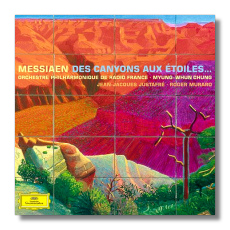
The Internet's Premier Classical Music Source
Related Links
- Messiaen Reviews
- Latest Reviews
- More Reviews
-
By Composer
-
Collections
DVD & Blu-ray
Books
Concert Reviews
Articles/Interviews
Software
Audio
Search Amazon
Recommended Links
Site News
 CD Review
CD Review
Olivier Messiaen

Des canyons aux étoiles
Roger Muraro, piano
Jean-Jacques Justafré, horn
Francis Petit, xylorimba
Renaud Muzzolini, glockenspiel
Orchestre Philharmonique de Radio France/Myung-Whun Chung
Deutsche Grammophon 471617-2 DDD 2CDs: 47:52, 44:15
Inspired, in part, by a 1972 trip to Bryce Canyon, Des canyons aux étoiles (From the Canyons to the Stars) was Olivier Messiaen's bicentennial birthday gift to the United States. In twelve movements, the work starts in the desert – a place associated with hermits, meditation, and the paring away of all that is nonessential. It ends with a vision of Paradise – the Celestial City – and also with a vision of Paradise on Earth as found in Utah's Zion National Park. Five of the movements are devoted to the composer's beloved birds and birdsong; we hear orioles, a robin, a mockingbird, the wood thrush, and other American birds. Like much of the composer's work (for example, Turangalîla), it presents the listener with a strange mixture of reductionist mysticism and musical sophistication.
Turangalîla, until recently considered a tough nut to crack, is relatively approachable compared to the Des canyons aux étoiles. While the former work is very human and sensual, there's something forbidding and awe-inspiring about the latter work's natural landscapes. (At the start of the fifth movement, Messiaen includes a quote by Ernest Hello: "To replace fear by awe opens a window for adoration.") The earlier work used a full symphony orchestra. In Des canyons aux étoiles, Messiaen pares the ensemble down to forty-three (only thirteen strings!), with very important roles for the percussion instruments. The work has been described as a concerto for piano and chamber orchestra. In fact, the piano is rarely silent, and pianist Paul Crossley has written that almost one-third of the work's total length is for solo piano. The lush sonorities of Turangalîla have been replaced with terse, savagely beautiful clamors and cries.
Crossley recorded this work with Esa-Pekka Salonen in 1988 (CBS Masterworks M2K44762). That recording, still available, remains a viable choice, and it includes excellent performances of Oiseaux exotiques and Couleurs de la cité céleste. Chung's recording includes nothing else; these two CDs are less than fifty minutes long, yet they are being sold at full price. In Chung's favor, however, is the authenticity factor; prior to recording Turangalîla, the conductor consulted with the composer, who duly gave Chung the nod. Chung's Messiaen is consistently superb, and this is no exception. More expansive and relaxed than Salonen, Chung gives the music more time to unfold. His pianist, Roger Muraro, is more percussive than Crossley, an impression intensified by Deutsche Grammophon's more upfront engineering. Really, you can't go wrong with either Salonen or Chung. (De Leeuw, unheard by me, also his has fans.)
Copyright © 2007, Raymond Tuttle




















